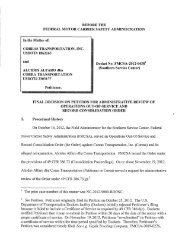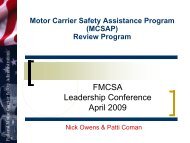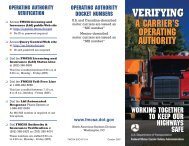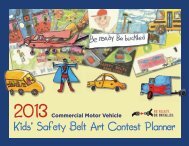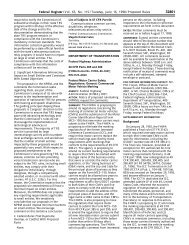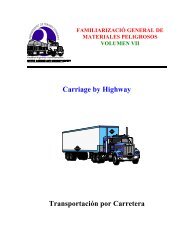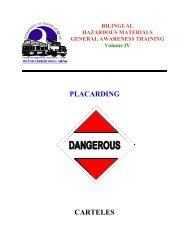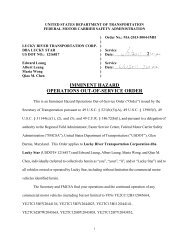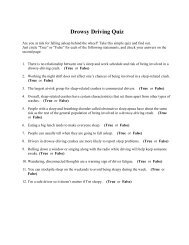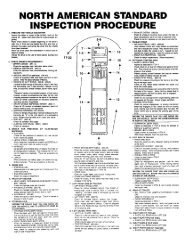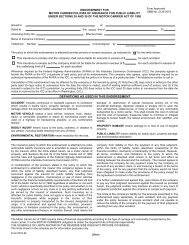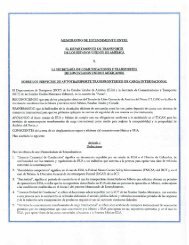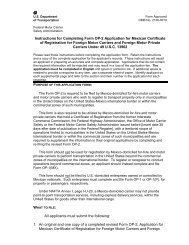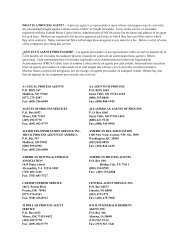Dear Sir/Madam - Federal Motor Carrier Safety Administration
Dear Sir/Madam - Federal Motor Carrier Safety Administration
Dear Sir/Madam - Federal Motor Carrier Safety Administration
Create successful ePaper yourself
Turn your PDF publications into a flip-book with our unique Google optimized e-Paper software.
<strong>Federal</strong> Register / Vol. 69, No. 161 / Friday, August 20, 2004 / Rules and Regulations 51591<br />
the administrative nature of the<br />
rulemaking. We considered remarks by<br />
meeting participants and written<br />
comments to the docket. Therefore,<br />
considering the statutory deadline,<br />
FMCSA did provide the public a 60-day<br />
comment period in which to offer<br />
comments and suggestions on how the<br />
procedural rules should be developed to<br />
implement section 4007 of TEA–21.<br />
Consistent with section 4007 of TEA–<br />
21, the IFR established requirements for<br />
receiving and processing waivers and<br />
exemptions, and initiating and<br />
managing pilot programs. FMCSA<br />
believes the requirements are<br />
administrative in nature and only reflect<br />
agency practice and procedure, because<br />
the IFR did not establish pass-fail<br />
criteria such as crash rates, safety<br />
ratings, compliance review results, or<br />
driving records for persons requesting<br />
waivers or applying for exemptions. For<br />
these reasons, we believe there was<br />
good cause to waive notice and<br />
comment through a NPRM.<br />
Furthermore, FMCSA stands by a<br />
previous determination that there was<br />
good cause under 5 U.S.C. 553(d)(3) to<br />
make the IFR immediately effective<br />
upon publication. Since the IFR was<br />
published prior to the statutory<br />
deadline, delaying the effective date<br />
would have been inconsistent with<br />
implementing the statute by the<br />
deadline, or as soon as possible<br />
thereafter.<br />
Hours of Service Rules<br />
IBT argues that FMCSA does not have<br />
statutory authority.to grant waivers and<br />
exemptions from the hours of service<br />
rules under 49 U.S.C. 31502<br />
(Requirements for Qualifications, Hours<br />
of Service, <strong>Safety</strong>, and<br />
EquipmentStandards). IBT believes that<br />
authority to issue waivers and<br />
exemptions and initiate pilot programs<br />
under 49 U.S.C. Chapter 313 (CMV<br />
Operators) or 49 U.S.C. 31136 is limited.<br />
FMCSA Response: Although the<br />
hours-of-service (HOS) regulations in 49<br />
CFR part 395 were originally<br />
promulgated under § 204 of the <strong>Motor</strong><br />
<strong>Carrier</strong> Act of 1935 (MCA) (now<br />
codified, in relevant part, at 49 U.S.C.<br />
31502), these regulations were reissued<br />
by law under the <strong>Motor</strong> <strong>Carrier</strong> <strong>Safety</strong><br />
Act of 1984 (MCSA) (now codified at 49<br />
U.S.C. 31136). The HOS rules are<br />
therefore eligible for waivers and<br />
exemptions.<br />
Section 206(a) of the MCSA required<br />
DOT to issue regulations ensuring,<br />
among other things, that ‘‘(2) the<br />
responsibilities imposed upon operators<br />
of CMVs do not impair their ability to<br />
operate such vehicles safely; (3) the<br />
physical condition of operators of CMVs<br />
is adequate to enable them to operate<br />
such vehicles safely; and (4) the<br />
operation of CMVs does not have<br />
deleterious effects on the physical<br />
condition of such operators’’ (codified,<br />
in slightly revised terms, at 49 U.S.C.<br />
31136(A)(2)–(4)). These provisions<br />
authorize the agency to adopt HOS<br />
regulations to prevent excess on-duty<br />
and driving time from degrading<br />
drivers’’ ability to operate large vehicles<br />
safely.<br />
Although DOT was generally required<br />
to complete all necessary rulemaking<br />
within 18 months after MCSA’s date of<br />
enactment, § 206(e) as recodified in<br />
1994, provides that ‘‘[i]f the Secretary<br />
does not issue regulations on CMV<br />
safety under this section, regulations on<br />
CMV safety prescribed by the Secretary<br />
before October 30, 1984, and in effect on<br />
October 30, 1984, shall be deemed in<br />
this subchapter to be regulations<br />
prescribed by the Secretary under this<br />
section’’ (49 U.S.C. 31136(d)).<br />
When the FHWA, FMCSA’s<br />
predecessor agency, prepared to<br />
implement § 206 of MCSA, it decided<br />
that significant changes to the HOS<br />
rules were not then required. FHWA<br />
published a final rule on May 19, 1988<br />
(53 FR 18042) making only minor<br />
revisions to 49 CFR part 395. Because<br />
that rule was issued considerably after<br />
the 18-month deadline in section 206(e),<br />
the existing HOS rules, as amended by<br />
the May 19 rule, were and are deemed—<br />
by law pursuant to 49 U.S.C. 31136(d)—<br />
to be issued under 49 U.S.C. 31136.<br />
Recognizing this fact, the May 19 rule<br />
amended the authority citation for Part<br />
395 to refer to the MCSA (then codified<br />
as 49 U.S.C. App. 2505,’’ now as 49<br />
U.S.C. 31136) as well as the MCA (then<br />
‘‘49 U.S.C.3102,’’ now 49 U.S.C. 31502).<br />
Therefore, IBT’s argument is<br />
incorrect. Because 49 U.S.C. 31315<br />
allows waivers or exemptions of rules<br />
issued under 49 U.S.C. 31136 (or 49<br />
U.S.C. chapter 313) and the HOS rules<br />
are issued under section 31136, FMCSA<br />
has statutory authority to grant waivers<br />
and exemptions from the HOS rules.<br />
Regulations Ineligible for Waiver and<br />
Exemption<br />
Many commenters identified<br />
regulations for which waivers and<br />
exemptions should not be considered.<br />
For example, Advocates requests that<br />
Parts 383 (CDL Standards), 391<br />
(Qualifications of Drivers), 392 (Driving<br />
of CMVs), 393(Parts and Accessories<br />
Necessary For Safe Operation), 395<br />
(Hours of Service of Drivers), 396<br />
(Inspection, Repair, And Maintenance),<br />
and 399 (Step, Handhold, and Deck<br />
Requirements for CMVs) be removed<br />
from the list. Additionally, Advocates<br />
VerDate jul2003 15:27 Aug 19, 2004 Jkt 203001 PO 00000 Frm 00045 Fmt 4700 Sfmt 4700 E:\FR\FM\20AUR1.SGM 20AUR1<br />
believes that § 390.19 (<strong>Motor</strong> carrier<br />
identification report) and § 390.21<br />
(Marking of CMVs) should be removed<br />
as well.<br />
OOIDA, AAMVA, Illinois, Michigan,<br />
and Ohio oppose exemptions, waivers,<br />
and pilot programs concerning Part 382<br />
(Controlled Substances and Alcohol Use<br />
and Testing). Alternatively, OOIDA<br />
believes the agency should exclude only<br />
those sections of part 382 that provide<br />
privacy and protection for drivers<br />
required to participate in controlled<br />
substances and alcohol testing.<br />
Illinois and Michigan oppose waivers,<br />
exemptions, or pilot programs<br />
concerning part 391 (Qualifications of<br />
Drivers). IIHS opposes inclusion of the<br />
hours-of-service rules, and West<br />
Virginia is opposed to precluding the<br />
requirements of § 390.21.<br />
FMCSA Response<br />
FMCSA recognizes the commenters’<br />
safety concerns. However, there is no<br />
apparent safety-related reason to change<br />
the list of regulations for which waivers<br />
and exemptions may be granted. The list<br />
of regulations in §§ 381.200, 381.300,<br />
and 381.400 is an indication that the<br />
agency will accept requests for waivers<br />
and exemptions and should not be<br />
construed as an indicator that the<br />
agency will grant waivers or exemptions<br />
which fail to satisfy the statutory<br />
requirements of TEA–21. FMCSA will<br />
review each request and waiver to<br />
ensure, to the greatest extent<br />
practicable, that they satisfy the<br />
statutory requirements. FMCSA believes<br />
it would be inappropriate to exclude<br />
safety regulations issued pursuant to 49<br />
U.S.C. Chapter 313 and 31136 from<br />
consideration under 49 CFR Part 381.<br />
FMCSA believes doing so would suggest<br />
the agency had predetermined that it is<br />
unlikely a person could develop an<br />
alternative means of achieving the safety<br />
outcomes provided by full compliance<br />
with specific regulations. Innovation is<br />
possible, and the regulations concerning<br />
waivers, exemptions, and pilot<br />
programs should not be so limited as to<br />
preclude consideration of alternative<br />
approaches to achieving or even<br />
improving motor carrier safety.<br />
Section 4007 of TEA–21 requires that<br />
the terms and conditions for all waivers<br />
and exemptions achieve a level of safety<br />
equivalent to or greater than what<br />
would be achieved by complying with<br />
the safety regulations. To satisfy this<br />
statutory test, persons requesting<br />
waivers or applying for exemptions<br />
must present a credible alternative to<br />
the regulation and explain how that<br />
alternative would achieve an equivalent<br />
or greater level of safety. If the request<br />
or exemption were effectively less



